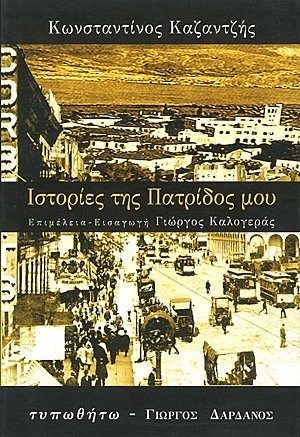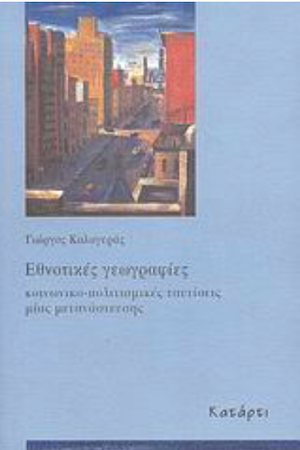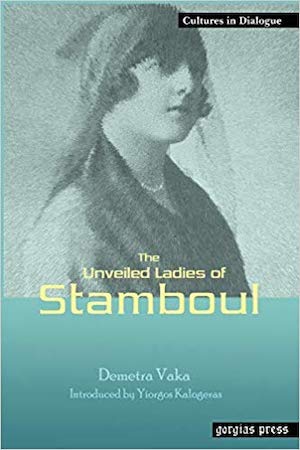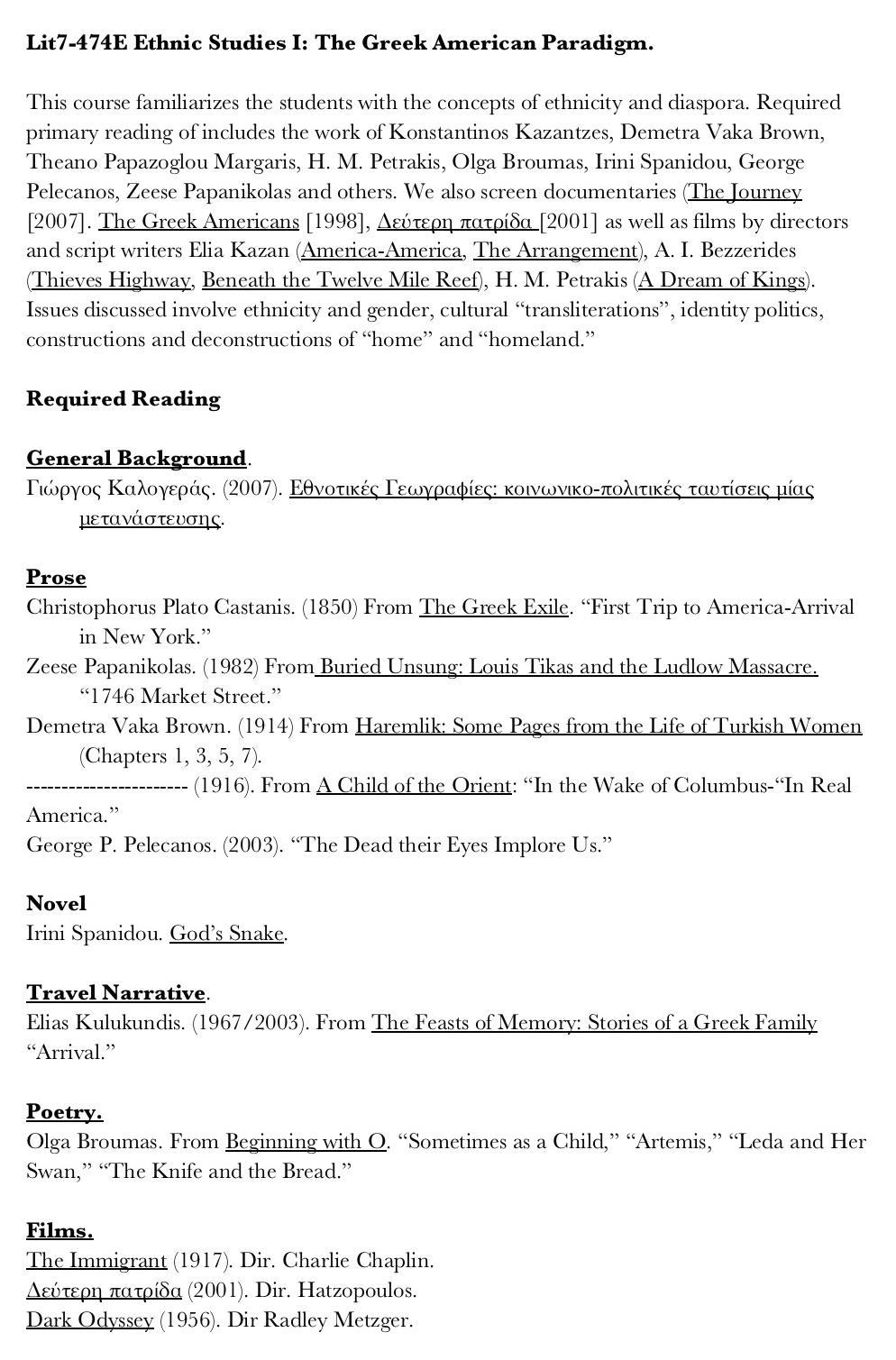Interview with Yiorgos Kalogeras
by Yiorgos Anagnostou
Yiorgos D. Kalogeras is Professor Emeritus of American Ethnic and Minority Literature. He taught until his retirement (2018) at the Department of English Aristotle University of Thessaloniki, Greece. He is the author, co-author and editor of ten books; he has produced numerous articles in Greek and English primarily in the field of Greek American Studies. His Ethnic Resonances in Performance, Literature and Identity is forthcoming by Taylor and Francis (2020).
Yiorgos Anagnostou is professor of transnational Modern Greek studies at The Ohio State University.
YA: You pioneered work in Greek American literary and cultural studies. What were the circumstances that brought about your interest in this field? What were the questions you asked early on, and what prompted you to raise them?
YK: Thank you for considering me a pioneer. However, I came into the field after the real pioneers had outlined it, Babis Malafouris, Elias Ziogas, Yiannis Tozios, Byron Raizis, Helen Papanikolas and many others. These people felt anxious to ensure the survival of the memory of the Greek immigration to the United States not only as a mass movement of economic immigrants. They insisted on safeguarding the cultural contribution the Greek immigrant made to their new home. The immigrants had brought to their new home one more language but also new cultural and, why not, ideological attitudes and manners.
I was 23 when a Fulbright Grant made it possible for me to come to the USA to take an MA course in American Literature. You see, I was fascinated by William Faulkner’s work having recently read Light in August as an undergraduate at the Aristotle University of Thessaloniki (AUTH). In 1973-74, the Ioannidis dictatorship but also my nonexistent knowledge of the U.S. educational system determined my choice of the U.S. institution. I had to decide fast and get out of Greece faster. In fact, it was the Late Professor of history Peter Topping, who had heard of me through his connections with the school of Philosophy, AUTH, who suggested I come to the University of Cincinnati (UC), Ohio. When I accepted I could not realize that I was making a crucial decision for my future. A couple of things then happened. In 1974, at the UC English Department, I took one of the earliest courses taught in the United States on Afro-American studies; then I found out that one of my professors was compiling the first bibliography of ethnic groups in the United States, and he asked me to do a small search on Greek Americans to help his assistant in the project. I felt quite inadequate for the task as I had absolutely no knowledge of the topic. But I struggled with the research and came up with some interesting information. Then, one evening at Peter Topping’s house over dinner, I was asked what my research would address. When I said Faulkner, one of the Greek American guests and an academic said why not Greek American literature. And I think that gave me the final push.
My initial focus was belles lettres. The very first question that I was asked was, “Is it worth it?” Is this really literature?” You see, the first question was not mine but it came from my professors. An immediate obstacle: I had to justify my very choice of the subject as a legitimate research topic. This was quite a source of anxiety for a graduate student who felt excited about his “discovery,” but also insecure about his choice. So my first project was to prove that these were books/texts worthy of discussion and analysis. I turned to the accolades that some of them had earned over the years, prizes, short lists for National Book Awards, etc. Then I searched for positive reviews in mainstream publications. At a time when Jewish American literature reigned supreme in the English Departments and while Afro-American studies were becoming more and more established academically, Greek American literature was searching for a place in American studies. Neither militant, nor community supported, nor actively discussed, it remained marginal or rather unknown to the broader public. If anyone knew anything about it, they knew or thought they knew that Nikos Kazantzakis was a Greek American! Kimon Friar’s translation of the Odyssey had enthroned him forever in the English language.
YA: What were some of the early challenges you faced as a researcher, and then a Greek American studies professor in a Greek University?
YK: I spoke earlier of the challenges I faced as a researcher in the United States during the 1970s. I should add that compiling a bibliography of Greek American literature was also a challenge and so was the locating of the sources. Remember it was a time before the internet. The pioneers I spoke of were helpful as they had firsthand knowledge of the authors. I located the authors, I wrote to them and they generously offered their books. Another big challenge was convincing my committee that I could include a chapter on ethnic autobiography in my final thesis.
When I was hired by AUTH in 1986 as an American studies scholar, it seemed that I would be able to realize my ambition to offer one of the first courses on Greek American literature. The department was happy to let me offer an elective course as long as I covered the required ones. It was a good arrangement for me in those days. Back in the middle 80’s, I also introduced Afro-American, Chicano and Native American literary texts in my standard Modern and Contemporary American Literature courses. This was a popular move and the course split in two with the section on Afro-Americans, Chicanos and Native Americans becoming eventually a separate course as Minority Discourse in American Literature. So my Greek American course focused on Ethnicity and Literature: The Greek American Paradigm. I had to show how Greek American writers were similar and yet different from other European American authors. My intention was to argue that they were U.S. writers with a difference.
YA: Could you take us through the arc of your development as a Greek American studies scholar? What were the major projects that defined your trajectory? Why were they important? In what ways did your research interests shift over time, and in response to what issues?
YK: Compiling two annotated bibliographies of Greek American literature that were eventually published in the now defunct Ethnic Forum made me really understand the wealth and power of what I was researching. My first publication in MELUS in 1986 gave me courage to continue writing about the subject. Somebody would bring out my papers! My publication in the Journal of Modern Greek Studies (JMGS) in 1989 eliminated the barriers between Greek and Greek American studies. It was the first article this journal published on a Greek American author or issue thus overcoming the prejudices of earlier editors.

My meetings and discussions with my colleagues in the English Department in the context of a biweekly seminar, at the time when the department was very theory oriented, helped me theorize certain issues in ethnic studies, especially issues that related to ethnic history and historiography. My study of the work and times of Konstantinos Kazantzes (1864-1927) along with the reissuing of his collection of short stories in 2001 made me understand in depth the meaning of diaspora and diasporization. My work on the reissuing of the first (2004) and the last book (2005) written by Demetra Vaka Brown (1877-1946) gave me a new perspective on the work and importance of this journalist. Essentially, Kazantzes and Vaka resolved for me the issues of how home and homeland relate to one another. I always believed in comparative studies of ethnic groups and my convictions were strengthened through my friendships and discussions with Italian American scholars from my position as President of The Society of Multi-Ethnic Studies, Europe and the Americas (MESEA). So I worked and have been working on an analysis of how the two groups at home and in the homeland have responded to representing immigration.
YA: Share with us the range of Greek American courses you taught. What was the overall goal? What was the experience of teaching Greek students about Greek America?
YK: Essentially, I taught a course called “Ethnicity and Literature: The Greek American Paradigm.”1 I offered this course every other semester from 1987 until 2011 when I took over the Department Chair and consequently had to reduce my teaching workload. The original idea was to teach a wide range of texts and provide the students with an overview of what has been and still is Greek American literature. This worked to an extent but it was also a case of overkill since the students walked away without having retained anything more than a few names. My approach then changed and I introduced the course with a modicum of theory about ethnicity and later diaspora and a few crucial texts. This appealed to the students; they started thinking about the broader implications of what we were discussing. They would consider the situation in their own country, the fact, that is, that Greece was becoming a nation that received immigrants from the neighboring countries especially after the political change in the countries of the Eastern Bloc. It turned out that the students were most comfortable to discuss the prejudices that Americans carried for the immigrants, but were surprised when challenged to consider their own and their parents’ prejudices for the incoming immigrants from the former Eastern Bloc. But that changed fast. The theoretical section of this course also raised questions about their own ethnic background as a lot of their grandparents had been refugees after 1922. There were also a number of students who were born abroad for example in Germany, Scandinavia, Australia and the U.S.A. who also began to consider and reevaluate their feelings about where they were and where they had been. This group was particularly receptive to the literature of the Greek Americans. It provided them with a certain sense of pride, and it abolished the stereotypes that people in Greece had for the Greek Americans and the immigrants in general. It also showed them how the Greek American artists or how an ethnic artist could evaluate and think critically about their home communities.
An equally interesting development took place among the students when I introduced texts that spoke of another type of experience. Irini Spanidou, Stratis Haviaras, and Olga Broumas were particularly popular as they provided students with role models of writers who spoke in English of traumas experienced by the books’ characters. These traumas were familiar to my students as well, although in another language. That gave my students the experience of how a trauma is distanced and described, how you can work your way through it by speaking about it in another language. For me this was a true revelation. And the students felt that way as well.

YA:
What does it mean to write about Greek America from an academic
position in Greece? What were your intended audiences? Was there a
primary public you wished to reach? I am thinking here also about your
decision to publish important books in Greek, which have not been
translated into English.
YK: When I started teaching at AUTH in 1986, there was no academic course on ethnicity or race taught at a Greek University. Perhaps that sounds like I was a pioneer of sorts and maybe I was but the point is that my course on ethnicity and my inclusion of issues of race in the other courses I taught were originally frowned upon. This was part of the European response to developments already taking place in the United States, and it was also part of the feeling that we were breaking away from the idea of literature as belle lettres. It had to do, as I mentioned earlier, with the fact that ethnic studies were not adequately theorized at a time when French literary theory was taking over academic curricula including my own Department’s. So part of my experience and struggle was to convince the local academic community that I was one of them as well. I remember that when I discussed Haviaras’s novel When the Tree Sings in the context of Bakhtinian theory, there was a sigh of relief in my department. So I had to prove that I was knowledgeable in current theoretical terms.

Things changed very fast though. So my intended audience was both the students I mentioned earlier but also colleagues. The students carried the discussions we had in class over to their homes. I remember one of the students saying that he was translating Vaka Brown’s book The Unveiled Ladies of Stamboul for his mother to read, another one that he brought home the Greek translation of Zeese Papanikolas’s Buried Unsung for his parents. Another student met Theano Papazoglou-Margaris’s grandson who teaches linguistics at Trinity College, Ireland. It was like slow fire that spread and spreads anarchically.
Now, my publishing Konstantinos Kazantzes’s Istories tis Patridhos mou was another matter. The book was the first literary volume in Greek to be published in the United States (Chicago) in 1910. Research on it was meant as an experiment on my part. I meant to initiate some discussion on Greek language writers who write in Greek in a country other than Greece or Cyprus. Kazantzes was my idea of a Greek writer who benefits from his diasporic experience and brings back echoes of German and U.S. literature in a Greek book. Apparently Kazantzes’s book has some connection with Dimitris Hatzis’ To telos tis mikris mas polis. After all, Kazantzes went to school and was a close friend with Hatzipelleren, Dimitris Hatzis’s father. Istories is a book worth reading apart from its significance as diasporic and/or ethnic literature. Its prologue dedicated to the Romanian Greek scholar Nikolaos Dosios is an early example expressing in literary terms an immigrant’s agony of losing one’s language and culture. There may have been other Greek writers who wrote on this. But studying Kazantzes, one finds a very intelligent well-read writer who absorbed the lessons he learned from Viziinos, Roidis, Schiller, Poe and Hawthorne among others.
The book was published but there was not much of a response from the Greek literature departments. Maybe in the future. At least, now we have a new edition of it (2001). The single original copy of 1910 I located is at the Gennadius Library in Athens.
The story of Papanikolas’s book Buried Unsung is of course very different and been circulating for a long while.
YA: Would you have made changes in the scope of your research and writing had you been practicing Greek American studies in a U.S. University?
YK: As I said earlier, the experience would have been quite different. The classes at AUTH were large. Up to 80 people would take the course not only because of the enrollment system here, but also because this course sounded exotic at first, perhaps unorthodox in an American literature program. But it consequently brought up issues closer to home for most of them than they had thought. In fact, I could say that it made sense, for some of them, as they felt that they were studying a culture (U.S.) that was not that foreign from what they knew. What I mean is they found out Greek ethnicity was part of the U.S. culture. And thus the program they were in was not too far removed from their experience.
I can only imagine that such a course would have attracted smaller numbers of Greek American or U.S. students in general who were studying in a Greek language and culture program. Their various ethnic backgrounds would have raised interesting questions, I’m sure. Comparing ethnicities is valuable, but understanding what the meaning of diaspora is for different national groups is something else, especially for the Greeks who hear about it from the time they begin school.
YA: What is the status, challenges, and prospects of Greek American studies in Greece today? In Europe? How has the landscape changed? Do you see a future?
YK: Since I retired a year ago, the course I taught has been removed from the program. Those students who are now employable cannot work in the department full-time because of the hiring freeze. Some occasionally take up a class or two and they include Greek American themes in their lectures. Poetry is particularly popular.
I can say, after all these years, that a Greek American writer is no longer an unknown figure in Greece. Neither is it unlikely that his work will be included in an academic course. Graduate students choose to write their theses on Greek American novels; in fact, a very competent thesis was recently produced on Virgin Suicides, another one on the U.S. response to the Greek Revolution in poetry, etc. These along with papers that occasionally come out of the department of Greek literature may be isolated cases, but they prove that the interest and the curiosity is there. It is important that we now see Greek American studies as a possibility for research.
YA: What is your sense about the direction of Greek American studies in the United States? How to empower this field?
YK: A recent call for papers for a comparative study of Greek and Italian ethnic matters attracted the attention of a small but interesting number of scholars in the States. Following similar types of ventures, we can render Greek American studies a bit more familiar to a broader academic public. Perhaps we cannot hope for the type of acceptance that Italian American studies enjoys, but we could gain ground in academic curricula.
YA: What is your vision for the field? What directions do you envision, and how can they materialize?
YK: We need to have opportunities to gather together people who work in the field. For example, a conference in Greek American studies would have been valuable. The one organized on the occasion of the Theodore Saloutos’s family donating the historian’s library to the Immigration History Research Center of the University of Minnesota in 1989 was tremendously successful. But unfortunately, it remained without a sequel. Perhaps the Modern Greek Studies Association should consider the possibility of organizing a conference or symposium around an exclusively Greek American theme.
Bringing together scholars in a comparative context would also make sense as in the case of the book in progress I mentioned earlier. It has pushed the Italian and Greek scholars to cross a boundary.
YA: Please raise your own question(s) and/or share with us what you think is important in this conversation.
YK: Greek scholars in the United States are uncomfortable with Greek American studies. Case in point: how long it took the Journal of Modern Greek Studies to publish an article on a Greek American author. The official policy is now more inclusive, but an issue on an exclusively Greek American theme is still to be published.
Greek scholars in Greece are interested but somehow shy away from the next move as they believe that they are getting in the way of American studies.
So where does that leave us?
The expertise of scholars from both fields is necessary. How can you discuss a writer like Theano Papazoglou Margaris (1906-1991) without understanding issues of American ethnicity? How can you analyze a film like Nyfes (Brides) if you cannot account for the cinematic references to Elia Kazan’s America America? As I said earlier, Konstantinos Kazantzes’s largely satirical short stories owe much to Roidis but the contextual references to Hawthorne and Poe among others are too obvious to ignore.
I believe that a lot of my own hopes, frustrations and criticisms that I have expressed over the years are recorded here. Equally important are the many good moments I experienced in Greece and abroad while working in American ethnic and minority studies. Thank you for allowing me to speak freely.
Notes
1.

